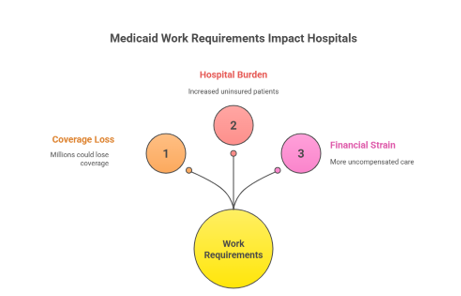
The new federal budget reconciliation law has introduced a significant change to Medicaid, nationwide work requirements for certain adults.
It’s shaping up to be one of the most significant shifts in Medicaid eligibility in decades. The change has the potential to affect millions of people, and it will have a ripple effect on hospitals, providers, and the patients they care for.
What’s Changing?
Starting in January 2027, some adults who qualify for Medicaid under the ACA expansion (ages 19–64) will need to show 80 hours a month of “community engagement” to keep their coverage.
That could mean paid work, volunteering, school, or job training, but it has to be documented and reported.
States will have to check compliance when someone signs up for Medicaid and then at least every six months after that. Implementation plans are due by mid-2026, which means the clock is already ticking.
Why This Matters
The Congressional Budget Office projects the policy will save the federal government $326 billion over 10 years, mostly because fewer people will stay on Medicaid.
Between 9.9 and 14.9 million people could lose coverage, with the hardest hit being:
- Low-income adults without children
- People with disabilities
- Caregivers
- Individuals who already face barriers to care
We’ve seen a preview of what could happen. When Arkansas tried a similar program in 2018, thousands lost Medicaid, not because they refused to work, but because they couldn’t keep up with the reporting process.
The Challenge for Hospitals
For healthcare providers, these new requirements mean:
- Staying ahead of eligibility changes so patients don’t unexpectedly lose coverage
- Navigating coordination between health systems, workforce programs, and state Medicaid offices
- Reaching patients quickly enough to prevent gaps in coverage
Without a plan in place, hospitals could face a jump in uninsured patients, more uncompensated care, and a heavier administrative burden.
How RCA Can Help Hospitals Prepare
For more than 30 years, Resource Corporation of America (RCA) has worked alongside hospitals to make sure patients get, and keep, the coverage they qualify for. With work requirements on the horizon, our role becomes even more critical.
Our Approach
- Proactive Eligibility Screening
Our Advanced Revenue Recovery Methods (ARRM) and AI-powered tools spot at-risk patients before coverage is lost. We can track work requirement compliance as part of our screening process and flag issues early. - Patient Education & Engagement
Our AI virtual agent, Elly, and our outreach team contact patients in their preferred language, explain what’s required, and walk them through reporting — whether digitally, by phone, or in person. - Documentation & Compliance Support
We make sure work hours, school attendance, or volunteer service are properly documented and sent to the right Medicaid channels. We also keep hospital financial counselors in the loop. - Insurance Discovery for Those Who Lose Coverage
If Medicaid coverage is lost, our system searches all insurance carriers to find other insurance options, helping hospitals reduce uncompensated care.
Turning a Challenge Into an Opportunity
Yes, the new law is a significant shift, but it’s also a chance for hospitals to show their commitment to patients. With RCA as a partner, providers can:
- Keep vulnerable patients from falling through the cracks
- Maintain coverage rates and revenue stability
- Lessen the administrative load of navigating federal mandates
Bottom Line:
The Medicaid work requirement law is coming fast. Preparation now means fewer patients left without care and fewer financial shocks to your organization.
RCA is ready to help hospitals and health systems navigate the changes, protect patients, and keep care accessible.
Contact us today at @www.resource-corp.com to start building your readiness plan.

Leave A Comment
You must be logged in to post a comment.